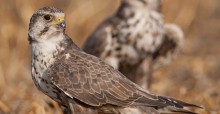
Saker Falcon (Falco cherrug) © Gabor Papp www.raptorimages.hu
World Wildlife Day is an opportunity to raise awareness of the intrinsic value of wildlife and to the way in which it contributes to the social, economic and cultural aspects of human well-being. Migratory birds of prey are a critically important part of many ecosystems. As top-level predators they can act as sentinels to the health of the environment. In addition, throughout human history certain raptor species have been afforded special cultural significance for many reasons. For example, the Saker Falcon (Falco cherrug) is considered a heritage icon by rulers and peoples, particularly in the Gulf Region, for its prowess as a hunter in falconry.




